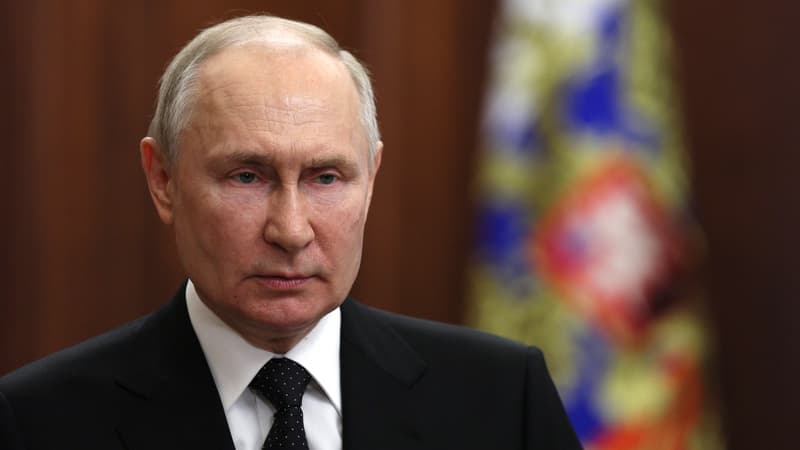Was it just a parenthesis? On Saturday, June 24, the mercenaries of the Wagner paramilitary group backed down after their leader Evgeny Prigokhine had sent them in the direction of Moscow in his failed attempt at a rebellion against the Russian General Staff.
In his speech on Saturday night, the Russian president forgave all parties involved and praised both Russian society, Wagner’s “patriotic” soldiers and his ally, the Belarusian president. Earlier this Monday, he struggled to organize a seemingly unchanged operation of the military and state. A strategy that seems to want to take this unprecedented questioning of his authority to an anecdotal episode in the country’s history.
The appeasement card
In a televised address Monday night at 10:10 p.m. Moscow time, the Kremlin chief played the appeasement card.
“Practically the entire Russian society was united by responsibility, by the homeland. All decisions were made to neutralize the danger, protect the constitutional order and the lives of our fellow citizens. The armed rebellion would have been controlled,” he said. he insisted.
Although he still recently called them “traitors”, he was lenient with the mercenaries involved, assuring that “most of Wagner’s fighters are patriots loyal to their people”, who “would have been used against the weapons of their brothers”.
“I thank the soldiers and Wagner fighters who made the decision to stop, who made it possible to stop the bloodshed,” he went on to declare.
The head of the Russian state offered a choice to the members of the militia: “They have the possibility to continue serving Russia, signing the contract with the Ministry of Defense”, that is, signing a contract with the army regularly, to “return with their families and loved ones” or “go to Belarus. He also took the trouble to thank his ally, Belarusian President Alexander Lukashenko.
Back to normal
Early Monday, Vladimir Putin refrained from mentioning the riot, in a video address released by the Kremlin on the occasion of a forum dedicated to industry and youth.
“The fact that he makes this unexpected appearance in a forum that has nothing to do with the strategic situation suggests that he wants to give the impression of a return to normality and that it was an accident of the news: but this, obviously, is not the case”, analyzed David Rigoulet-Roze, a researcher at the Institute of International and Strategic Relations (Iris), interviewed on BFMTV.
Moscow also returned to the terms of the agreement made with Yevgeny Prigojine under the aegis of the Belarusian president. The Kremlin had initially announced an agreement that provided for the charges against Wagner’s boss to be dropped.
But, in fact, it is still the subject of an investigation (initiated by “call to an armed riot”) according to a source in the Russian General Prosecutor’s Office, quoted by the three main Russian agencies. A method that is more attached to the normal march of the country.
Reassure about the state of the armed forces
Another request from Prigojine, the dismissal of Defense Minister Sergei Shoigu does not seem to be on the agenda, if we trust the images broadcast by Russian public television Rossia 24 on Monday. After disappearing during the Wagner operation and while various Telegram channels close to the Kremlin reported rumors of a replacement, Sergei Choïgou signs his first public appearance since the revolt.
The minister is shown reviewing Russian forces at a command post in Ukraine, with apparent calm. According to these video excerpts, he “held a meeting with the leaders” of one of the units.
Another external sign of the Kremlin’s desire to reassure about the state of its forces, the head of Russian diplomacy Sergei Lavrov assured that Wagner would continue its operations in Mali and the Central African Republic, where its members work as “military instructors” according to his statements. words. The rebellion of this organization in Russia will not affect the relationship between Moscow and its allies, he added in an interview with the Russian channel RT.
However real flaws
Through these media elements, the Kremlin has an objective: “to give the impression that nothing happened this weekend”, according to David Rigoulet-Roze, editor of the magazine. strategic directions.
“Actually, the shock wave is important, because it touched the very substance of that vertical of power”, estimates the researcher. “The doubts that have arisen are not only facing the outside, they are also internal.”
Vladimir Putin “always uses members’ propaganda methods (…): he tries to ignore the event, as if it never existed,” said Zaline Steve, a member of the Russia-Libertades association on the BFMTV microphone. .
But according to her, the Russian opposition is delighted to have seen “clearly the cracks in Putin’s regime” through this slight by Wagner.
“The march has brought to light serious security problems in the country,” the Wagner leader said in his first audio message since the uprising ended Saturday night, saying his men had traveled 780 kilometers colliding with little endurance. He did not reveal his whereabouts, while the Kremlin assured that he would leave for Belarus, although without specifying when.
Source: BFM TV


